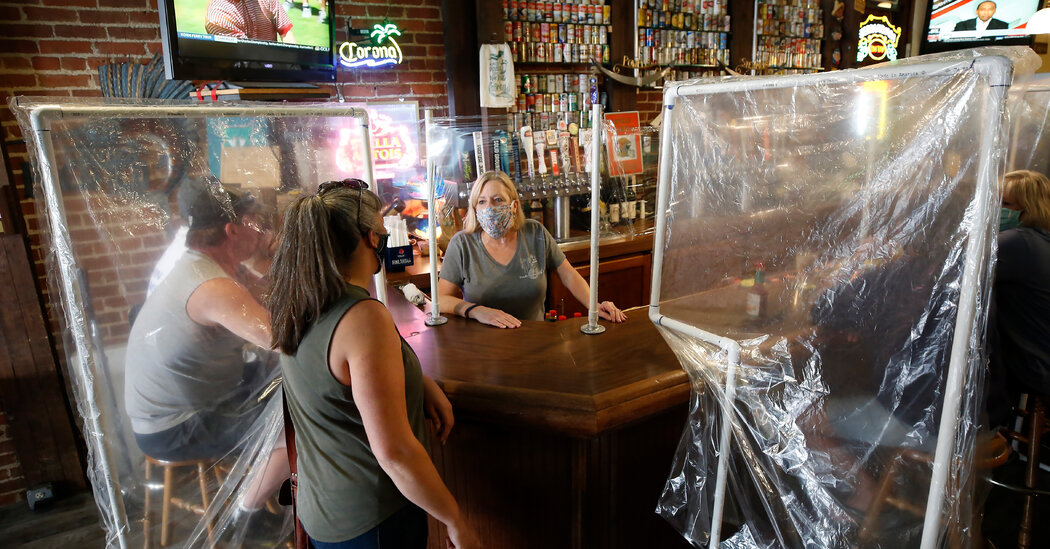
Most researchers say the screens most likely help in very specific situations. A bus driver, for instance, shielded from the public by a floor-to-ceiling barrier is probably protected from inhaling much of what passengers are exhaling. A bank cashier behind a wall of glass or a clerk checking in patients in a doctor’s office may be at least partly protected by a barrier.
Understand the State of Vaccine and Mask Mandates in the U.S.
-
- Mask rules. The Centers for Disease Control and Prevention in July recommended that all Americans, regardless of vaccination status, wear masks in indoor public places within areas experiencing outbreaks, a reversal of the guidance it offered in May. See where the C.D.C. guidance would apply, and where states have instituted their own mask policies. The battle over masks has become contentious in some states, with some local leaders defying state bans.
- Vaccine rules . . . and businesses. Private companies are increasingly mandating coronavirus vaccines for employees, with varying approaches. Such mandates are legally allowed and have been upheld in court challenges.
- College and universities. More than 400 colleges and universities are requiring students to be vaccinated against Covid-19. Almost all are in states that voted for President Biden.
- Schools. On Aug. 11, California announced that it would require teachers and staff of both public and private schools to be vaccinated or face regular testing, the first state in the nation to do so. A survey released in August found that many American parents of school-age children are opposed to mandated vaccines for students, but were more supportive of mask mandates for students, teachers and staff members who do not have their shots.
- Hospitals and medical centers. Many hospitals and major health systems are requiring employees to get a Covid-19 vaccine, citing rising caseloads fueled by the Delta variant and stubbornly low vaccination rates in their communities, even within their work force.
- New York. On Aug. 3, Mayor Bill de Blasio of New York announced that proof of vaccination would be required of workers and customers for indoor dining, gyms, performances and other indoor situations, becoming the first U.S. city to require vaccines for a broad range of activities. City hospital workers must also get a vaccine or be subjected to weekly testing. Similar rules are in place for New York State employees.
- At the federal level. The Pentagon announced that it would seek to make coronavirus vaccinations mandatory for the country’s 1.3 million active-duty troops “no later” than the middle of September. President Biden announced that all civilian federal employees would have to be vaccinated against the coronavirus or submit to regular testing, social distancing, mask requirements and restrictions on most travel.
A study by researchers with the National Institute for Occupational Safety and Health in Cincinnati tested different sized transparent barriers in an isolation room using a cough simulator. The study, which hasn’t yet been peer-reviewed, found that under the right conditions, taller shields, above “cough height,” stopped about 70 percent of the particles from reaching the particle counter on the other side, which is where the store or salon worker would be sitting or standing.
But the study’s authors noted the limitations of the research, particularly that the experiment was conducted under highly controlled conditions. The experiment took place in an isolation room with consistent ventilation rates that didn’t “accurately reflect all real-world situations,” the report said.
The study didn’t consider that workers and customers move around, that other people could be in the room breathing the redirected particles and that many stores and classrooms have several stations with acrylic barriers, not just one, that impede normal air flow.
While further research is needed to determine the effect of adding transparent shields around school or office desks, all the aerosol experts interviewed agreed that desk shields were unlikely to help and were likely to interfere with the normal ventilation of the room. Depending on the conditions, the plastic shields could cause viral particles to accumulate in the room.
“If there are aerosol particles in the classroom air, those shields around students won’t protect them,” said Richard Corsi, the incoming dean of engineering at the University of California, Davis. “Depending on the air flow conditions in the room, you can get a downdraft into those little spaces that you’re now confined in and cause particles to concentrate in your space.”
Aerosol scientists say schools and workplaces should focus on encouraging workers and eligible students to be vaccinated, improving ventilation, adding HEPA air filtering machines when needed and imposing mask requirements — all of which are proven ways to reduce virus transmission.
